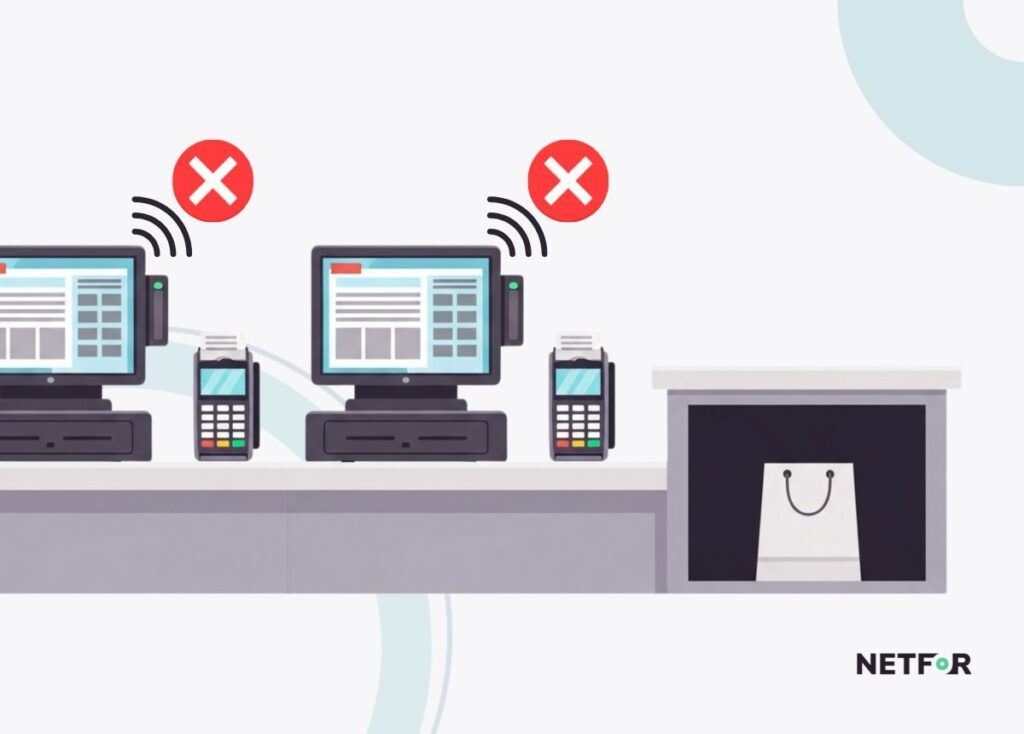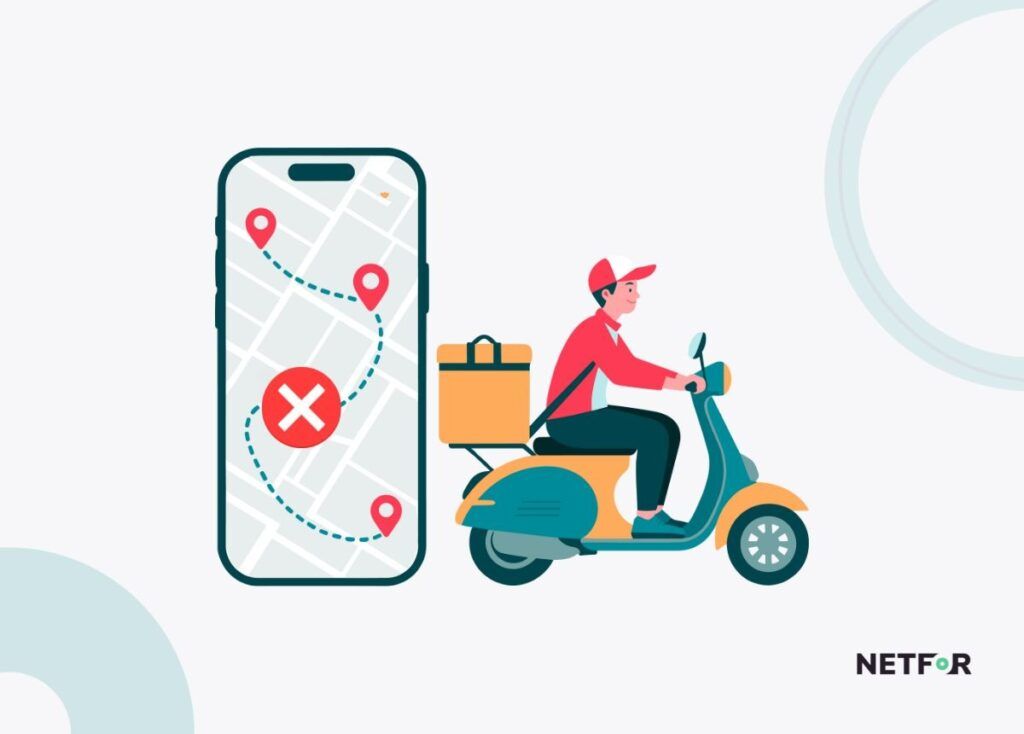Super Bowl Sunday exposes the weakest links in QSR technology. While wing orders spike 87% and delivery platforms handle more than half of all off-premise demand, downtime costs can escalate to over $14,000 per minute for major chains. In this high-pressure environment, a single point of failure, whether it is a frozen POS terminal, a severed network cable, or a crashed delivery tablet, can halt sales, overwhelm staff, and permanently damage customer loyalty (Toast POS, 2024).
Modern Quick Service Restaurants (QSRs) operate on fragile, interconnected technology stacks. The days of standalone cash registers are gone, replaced by complex ecosystems where digital menu boards, kitchen display systems (KDS), and mobile ordering apps must sync perfectly in real-time. When demand surges during the Super Bowl, these systems are pushed to their breaking point.
This guide breaks down how effective QSR support, combining responsive help desk services with nationwide field services, keeps restaurants operational during the most demanding day of the year. By understanding the specific stressors of peak events and implementing a proactive support model, franchise operators can turn potential IT disasters into record-breaking sales days.
Field Services Are the Backbone of QSR IT, Not a Backup Plan
Many organizations view field services as a last resort, a button to press only when all remote troubleshooting fails. However, in the high-stakes environment of a commercial kitchen, QSR uptime is ultimately determined by physical execution, not just software code. The operational reality of repairing restaurant technology requires a physical presence that remote desktop tools cannot replicate.
When a fryer grease fire melts a KDS cable or a frantic employee trips over a power cord during the lunch rush, no amount of remote support can resolve the issue. These are physical failures requiring physical remediation. Effective QSR IT support recognizes that field services function as the critical final escalation layer, ensuring that hardware issues are resolved rapidly and correctly.

The Necessity of On-Site Repair
Certain failures essentially stop operations until a technician arrives on-site. Real-world scenarios often dictate that a truck roll is the only path to resolution:
- POS Terminal Replacement: If a unit suffers liquid damage from a spilled soda, it requires an immediate swap and reconfiguration.
- Network Switch Re-termination: Corroded or damaged ethernet jacks can sever connectivity for an entire station, requiring physical re-cabling.
- KDS and Digital Display Swaps: A blank kitchen screen means cooks are flying blind. Replacing these mounted units requires tools and safety protocols that store staff do not possess.
Strategic Scheduling in a 24/7 Environment
Field service in the QSR sector faces unique scheduling constraints. You cannot shut down a drive-thru for IT maintenance during the lunch rush without incurring massive revenue losses. Professional QSR support teams utilize sophisticated scheduling to work around operational peaks:
- Lull-Period Diagnostics (2–4 PM): Technicians perform non-intrusive troubleshooting during the standard mid-afternoon dip in traffic.
- Overnight Deployments (2–5 AM): Major hardware rollouts or complex cabling jobs are executed when the store is closed or at its quietest, ensuring zero disruption to customers.
- Rush-Hour Avoidance: Dispatch protocols specifically block non-emergency tickets during peak meal times to keep the kitchen flowing.
QSR IT support breaks down when field services are treated as an afterthought instead of a planned, integrated part of restaurant operations. By integrating field services into the core support strategy, brands ensure they have the hands-on capability to recover from physical failures that remote agents simply cannot touch.
Super Bowl Sunday Is a Stress Test For QSR Technology
The Super Bowl does not just bring more customers; it fundamentally changes how they order and what they buy. This event creates demand distortion, stressing specific nodes of the restaurant’s infrastructure while leaving others idle. Understanding these patterns is crucial for preparing your QSR support strategy.
The sheer volume of specific items places a continuous, intense load on kitchen equipment. For example, the 87% increase in wing sales means fryers and their associated sensors are operating at maximum capacity for hours. If a temperature sensor fails or a filtration system clogs under this load, the kitchen loses its primary production capacity for the day’s most popular item (Toast POS, 2024).

The Dominance of Delivery Platforms
Digital dependence peaks during the Super Bowl. With 54% of delivery traffic flowing through DoorDash alone, a failure in the integration between the delivery tablet and the POS system is catastrophic (Consumer Edge, 2024). If the API connection drops or the tablet freezes, orders may pile up in the cloud without ever printing in the kitchen. This silent failure leads to a massive backlog of unfulfilled orders, angry customers, and unrecoverable revenue. And the unthinkable: No wings on Super Bowl Sunday.
The Kickoff Cliff and Repair Windows
Traffic patterns on Super Bowl Sunday offer a unique tactical advantage for IT support, provided they are understood. The day is defined by the “Kickoff Cliff,” where transaction volume drops by approximately 47% the moment the game begins (Toast POS, 2024).
- Pre-Game Surge: Intense pressure on all systems leading up to kickoff.
- The Cliff: A sharp drop in orders at kickoff.
- The Window: This creates a distinct repair window between 6:30 PM and 9:30 PM EST.
Smart QSR support teams utilize this window to address non-critical break/fix issues that may have accumulated during the pre-game rush. Dispatchers can schedule technicians to arrive right at kickoff, allowing them to work on equipment without disrupting the flow of service, as the dining room and drive-thru lanes typically empty out.
Common QSR Technology Failures Are Rarely Random
Technology failure in a modern QSR is rarely the result of bad luck. It is typically a systemic cascade triggered by three specific factors: configuration errors, third-party dependency risks, and the hostile environment of the kitchen itself.
The Risk of Configuration Changes
In a cloud-centric environment, a single error can propagate globally in seconds. The McDonald’s global outage in 2024 served as a stark reminder of this vulnerability. It was not a cyberattack, but a “configuration change” by a third-party provider that took down kiosks and mobile ordering apps across multiple continents (McDonald’s Corp, 2024). This highlights the danger of centralized dependency; a single bad file push can disable thousands of locations simultaneously.
Third-Party Contagion
Similarly, the Starbucks mobile ordering outage caused by CrowdStrike demonstrated how third-party vendors introduce contagion risk (Restaurant Business, 2024). A flawed security update from a vendor disabled critical systems, forcing customers to order in-store and destroying efficiency. QSRs are reliant on a stack of vendors for POS software, payment processing, and security. A failure in any layer can halt commerce.
Environmental Hostility
Finally, the physical reality of a commercial kitchen destroys standard electronics. Grease, heat, and humidity are constant enemies.
- Grease Fog: Airborne grease coats internal components, causing overheating in units that lack proper sealing.
- Cable Chaos: The tangle of wires under a counter is a primary cause of local outages. Rushed employees often trip over cables or unplug switches to charge phones.
- Liquid Damage: Without industrial-grade ingress protection (IP54 or higher), spills can short out terminals instantly.
Recognizing these failure patterns allows QSR IT support teams to move from reactive to proactive. Ensuring hardware is kitchen-grade and strictly controlling configuration updates before peak events are essential steps in mitigating these risks.
Where Help Desk Ends and Field Services Become Mission-Critical
Efficiency in QSR support relies on a delicate balance between the Help Desk (remote support) and Field Services (on-site support). The goal is to resolve issues remotely whenever possible to avoid the cost and delay of a truck roll, but to deploy field resources instantly when remote fixes fail.
The Economics of Escalation
The Escalation Rate measures the percentage of tickets passed from remote support to field dispatch. Industry benchmarks suggest that only about 33% of QSR issues should truly require escalation to field services (Netfor, 2025).
- Remote Resolution: A remote fix costs minutes of agent time.
- Truck Roll: An on-site dispatch involves travel time, vehicle costs, and minimum hour commitments, often costing 10 to 20 times more than a remote resolution.
However, a low escalation rate is not always better. Failing to dispatch a technician for a hardware failure results in extended downtime. The key is accuracy, knowing exactly when to stop troubleshooting remotely and send a professional.
First Run Rate (FRR): The Ultimate Metric
When a technician is dispatched, they must fix the issue on the first visit. This is measured by the First Run Rate (FRR).
- Industry Average: Approximately 88%.
- High Performance: Best-in-class providers achieve 95% or higher (Netfor, 2025).
The gap between average and high performance represents millions in lost revenue. A failed first run usually happens because of poor triage (diagnosing the wrong part), an unprepared technician (lacking specific tools), or scope creep. High-quality QSR support providers bridge this gap with robust Knowledge Management systems that map vague descriptions like “the screen is dark” to specific technical issues, ensuring the technician arrives with the correct replacement part in hand.
The Real Cost of Downtime for Quick Service Restaurants
In the QSR industry, time is literally money. The cost of downtime is a composite of lost sales, wasted labor, and spoiled inventory. During a Super Bowl surge, these costs are magnified significantly.
The Financial Impact Per Minute
Data indicates that the average cost of downtime for mid-sized organizations is approximately $5,600 per minute. For large enterprise chains, this figure can exceed $14,000 per minute.
Consider a 30-minute outage during the Super Bowl pre-game rush. For a large wing chain, this could theoretically cost over $400,000 in lost revenue across the network. Even for smaller operators, the loss of peak trading hours can wipe out the profit margin for the entire month.
Hidden Operational Losses
The direct loss of transactions is only the tip of the iceberg.
- Online Ordering Evaporation: In the digital age, customers do not wait. If your app is down, they switch to a competitor instantly. These sales are not deferred; they are lost permanently (SORA Partners, 2025).
- Labor Efficiency: Staff standing idle during an outage are still on the clock, driving up labor costs while revenue hits zero.
- Inventory Spoilage: If back-of-house systems monitoring walk-in coolers fail, thousands of dollars in inventory could be jeopardized.
The Failure of Break/Fix Models
Many operators rely on a break/fix support model, where they pay for repairs only when things break. This model collapses under peak pressure. Break/fix providers rarely offer guaranteed response times (SLAs) or 24/7 support. When a POS fails at 5 PM on Super Bowl Sunday, a break/fix technician may not be available until Monday morning.
Managed QSR IT support, by contrast, operates on a proactive model. It includes preventative maintenance to catch failing hard drives or overheating CPUs before the rush begins, ensuring predictable uptime rather than unpredictable repair bills.
Gear Up Before The Game
The 2026 Super Bowl will test the resilience of every Quick Service Restaurant in the country. The difference between a record-breaking sales day and an operational disaster lies in the quality of your QSR support.
Operators can no longer view IT support as a commodity to be bought at the lowest hourly rate. It is operational insurance. By partnering with a provider that offers 24/7 help desk capabilities, nationwide field service coverage, and a focus on high First Run Rates, QSR brands can inoculate themselves against the chaos of peak events.
Don’t wait for the kickoff to discover your system’s breaking point. Prepare your infrastructure now, secure your support partners, and ensure that when the rush comes, your technology is ready to serve.

